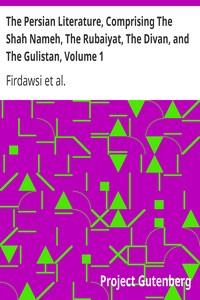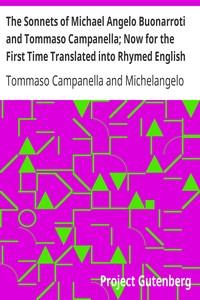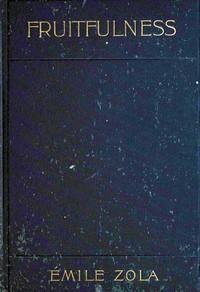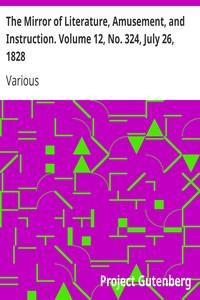|
|
Read this ebook for free! No credit card needed, absolutely nothing to pay.Words: 151152 in 38 pages
This is an ebook sharing website. You can read the uploaded ebooks for free here. No credit cards needed, nothing to pay. If you want to own a digital copy of the ebook, or want to read offline with your favorite ebook-reader, then you can choose to buy and download the ebook.

: The Persian Literature Comprising The Shah Nameh The Rubaiyat The Divan and The Gulistan Volume 1 by Firdawsi Hafiz Active Th Century Omar Khayyam Gottheil Richard J H Richard James Horatio Contributor Atkinson James Translator Bicknell Herman Translator F@FreeBooksTue 06 Jun, 2023 THE SH?H N?MEH Introduction Kai?mers H?sheng Tah?mers Jemsh?d Mirt?s-T?z?, and His Son Zoh?k Kavah, the Blacksmith Ferid?n Ferid?n and His Three Sons Min?chihr Z?l, the Son of S?m The Dream of S?m R?d?beh Death of Min?chihr Nauder Afr?siy?b Marches against Nauder Afr?siy?b Zau Garsh?sp Kai-Kob?d Kai-K??s The Seven Labors of Rustem Invasion of Ir?n by Afr?siy?b The Return of Kai-K??s Story of Sohr?b The Story of Sai?wush Kai-Khosr?u Akw?n D?w The Story of Byzun and Man?jeh Barz?, and His Conflict with Rustem S?sen and Afr?siy?b The Expedition of G?darz The Death of Afr?siy?b The Death of Kai-Khosr?u Lohur?sp Gusht?sp, and the Faith of Zerdusht The Heft-Khan of Isfendiy?r Capture of the Brazen Fortress The Death of Isfendiy?r The Death of Rustem Bahman H?ma? and the Birth of D?r?b D?r?b and D?r? Sikander Firdusi's Invocation Firdusi's Satire on Mahmud THE RUB?IY?T Introduction Omar Khayy?m The Rub?iy?t THE DIVAN Introduction Fragment by H?fiz The Divan THE SH?H N?MEH FIRDUSI INTRODUCTION When Sir John Lubbock, in the list of a hundred books which he published, in the year 1886, as containing the best hundred worth reading, mentioned the "Sh?h N?meh" or "Book of Kings," written by the Persian poet Firdusi, it is doubtful whether many of his readers had even heard of such a poem or of its author. Yet Firdusi, "The Poet of Paradise" , is as much the national poet of Persia as Dante is of Italy or Shakespeare of England. Abul Kasim Mansur is indeed a genuine epic poet, and for this reason his work is of genuine interest to the lovers of Homer, Vergil, and Dante. The qualities that go to make up an epic poem are all to be found in this work of the Persian bard. In the first place, the "Sh?h N?meh" is written by an enthusiastic patriot, who glorifies his country, and by that means has become recognized as the national poet of Persia. In the second place, the poem presents us with a complete view of a certain definite phase, and complete era of civilization; in other words, it is a transcript from the life; a portrait-gallery of distinct and unique individuals; a description of what was once an actual society. We find in it delineated the Persia of the heroic age, an age of chivalry, eclipsing, in romantic emotion, deeds of daring, scenes of love and violence, even the mediaeval chivalry of France and Spain. Again, this poem deals principally with the adventures of one man. For all other parts of the work are but accessories to the single figure of Rustem, the heroic personage whose superhuman strength, dignity, and beauty make him to be a veritable Persian Achilles. But when we regard the details of this work we see how deeply the literary posterity of Homer are indebted to the Father of European Poetry. The fantastic crowd of demons, peris, and necromancers that appear as the supernatural machinery of the Sh?h N?meh, such grotesque fancies as the serpents that grew from the shoulders of King Zoh?k, or the ladder of Zerdusht, on which he mounted from earth to heaven--all these and a hundred other fancies compare unfavorably with the reserve of Homer, in his use of such a personage as Circe, and the human grace and dignity which he lends to that genial circle on Olympus, whose inextinguishable laughter is called forth by the halting wine-bearer a god like themselves. While we read the "Sh?h N?meh" with keen interest, because from its study the mind is enlarged and stimulated by new scenes, new ideas and unprecedented situations, we feel grateful that the battle of Salamis stopped the Persian invasion of Europe, which would doubtless have resulted in changing the current of literature from that orderly and stately course which it had taken from its fountain in a Greek Parnassus, and diverted it into the thousand brawling rills of Persian fancy and exaggeration. THE SH?H N?MEH KAI?MERS Free books android app tbrJar TBR JAR Read Free books online gutenberg More posts by @FreeBooks
: The Sonnets of Michael Angelo Buonarroti and Tommaso Campanella; Now for the First Time Translated into Rhymed English by Campanella Tommaso Michelangelo Buonarroti Symonds John Addington Translator - Italian poetry Translations into English; Michelangelo@FreeBooksTue 06 Jun, 2023
|
Terms of Use Stock Market News! © gutenberg.org.in2025 All Rights reserved.






